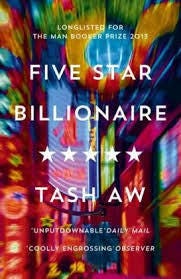Book Club Review: Five Star Billionaire by Tash Aw
For every book we read during the book club, one of our book club members will write a review. This way anyone who couldn’t be there, can still join in with the fun! Our seventh book is Five Star Billionaire by Tash Aw and the review is written by Michelle Carmody.
The life-advice section in any bookstore is usually the shiniest, the brightest, with the glossiest covers and the snappiest titles. When I lived in Argentina I was seduced by the prospect of an organized life that the books in this section offered me, the promise of pulling me out of my rut and helping me make good use of my time, to seize the day and to make the most of the great opportunity that living in a foreign country offered. While these books appeal to, and are aimed at, any and every sector of the population, perhaps they hold a special appeal to migrants, to transitory populations seeking a path, in lieu of a fixed place.
The migrants in Five Star Billionaire are all floating in foreign space, looking for a path forward. No one sees Shanghai as a permanent option. The five stars of Five Star Billionaire are Yinghui, Phoebe, Gary, Justin and Walter; all Malaysian emigrants of varying social status, making it work in Shanghai. The most interesting of these characters is Phoebe, who really seems to be the personification of new South East Asia. Phoebe arrives in Shanghai by way of Shenzhen, the factory floor of the world. She comes to Shanghai because it offers her somewhere to sleep, the floor of the tiny apartment of a friend from her Malaysian village. But it also offers her the prospect of making it big, of moving up in the world beyond the factory floor to the upper levels of life.

Phoebe follows various self-improvement manuals, absorbing the advice of gurus on how to get rich and how to get a man – the latter being the key to the former – until she completely transforms herself and becomes a creation of these books. Phoebe sets out to exploit the possibilities that the new China offers rural women like her. She steals an ID card, which allows her to literally stumble into a job, and from there she sets about finding the perfect mate while managing a workforce of fellow migrants who, having come from the countryside to the city, have not made the transition to city girl Phoebe has.
She masters the ability to chat online with multiple men, filtering out the useless ones. Through this she meets both Walter and Gary. Gary is a disgraced pop megastar; Walter is an uber-tycoon who, when not writing self-improvement manuals, is busy completing the acquisition and destruction of both Justin and Yinghui’s successful business empires. The connection between the five migrants is Jackie Collins-esque: there is deception so obvious to everyone except the deceived, there is revenge for something that happened long before the avenger even opened his first bank account; there is a fall from grace that Britney herself could be proud of. There is no sex.
In many ways this book fails to really capture the energy of five lives open to potential and being thrown around by the city of Shanghai and its mixture of possibilities and limitations. The story arcs, and especially the connections, are far-fetched and some characters are under-developed. But in other ways this book gives a glimpse into the contradictions of emerging China. Yinghui has made it big as a businesswoman, but is ultimately brought down by social conventions and traditions that lead her to submit to Walter and lead Walter to extract revenge on her for the humiliation of his father by hers. Phoebe suffers from increasing existential angst brought on through her masquerading as a successful businesswoman. Heritage buildings in the heart of Shanghai and KL are being torn down and used as the foundation for new fortunes.
Zizek has talked about the rise of China as evidence of a kind of ‘capitalism with Asian values’. While in many respects this book is unsuccessful as a story, it plays with this idea of unrestrained capitalism and its promise of self-improvement and entrepreneurial (re)invention, and the clash with tradition, convention and the past. The self-improvement that Phoebe undergoes allows her to find a path in a foreign city, allows her to exploit opportunities and Shanghai itself to the fullest possible extent. She reaches a limit, though, and eventually accepts that return to her village is inevitable. As her roommate puts it, ‘where else am I supposed to go?’. The anything-goes, get-rich-quick environment of Shanghai offers endless possibilities, but those who are floating in its space are still restrained by their past, by the traditions and conventions that follow them into their new lives and pull them back into the old. While this book fails to capture the energy of contemporary China, it does point to many of the contradictions in the model of uber-development through replication, the paint-by-numbers approach to moving up in the world and what the personal and social implications of that might be.
Written by Michelle Carmody



